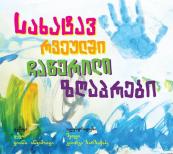TALES WRITTEN IN A DRAWING ALBUM
ANPHIMIADI DIANA
This short, happy and humorous book of tales has an interesting story of creation. The book is based on drawings by a five-year-old boy with autism spectrum. The book that is a product of cooperation between mother, child and the illustrator is shaped as an amusing game that might be useful for every parent and a child. Mother brought her child’s drawings to life, made them speak even before the boy could say his first words. This interactive method would be useful for every parent and a child, those who are looking for the new ways of communication. Besides amusing illustrations, the stylistic aspect of the tales is also interesting. Light, colorful stories talk about love, friendship, mother-son relationship, anger, play, books and most importantly about the uniqueness of every human being. The book is a result of interesting collaboration between mother and the son. Considering Georgian literary context, the book itself is unique and apart from that by showing little boy’s art, the book will help to fight social stigmas and stereotypes about autism. The text itself employs the vocabulary that is inviting for beginning readers, considering that stories are told with a light and gentle didactic tone that makes the reading not only pleasurable but also useful.
EXTRACT
EXTRACT
translated into english by Phillip Price
What we look like from the Moon
“Mum, what do we look like from the moon?” asked Gio one evening. He was wearing pyjamas with stars on them and looking at the sky through the window in his bedroom.
“Won’t the people who live on the moon think that all of us down here on earth are weird? They’ll only be able to see our heads, shoulders, and shoes from up there, won’t they?”
Gio’s mum, Diana, was busy putting a clean sheet on Gio’s bed, and so she brushed him off with a short, unsatisfactory answer.
“We look exactly how we are.”
“Well how do we look, then? What about me, for example? Do I look the same to you and Dad?”
“You’re always the same Gio, but when I look at you, I see my Gio, and when Dad looks at you, he sees his Gio. When we look at people we love, we see our love in them.”
“I don’t get it. So, if you stop loving me, does that mean I’ll look different?”
“Maybe a little bit different, but I’ll never stop loving you, so you don’t have to worry about that.”
“Good.”
“Now get into bed and go to sleep. Do you want me to read to you, or shall I put out the light?”
“Put it out.”
“Right. Night night, my little lamb. Give me a kiss.”
“Mum, so does that mean the people who live on the moon can only see us if they love us?”
“I suppose it does.”
“So does that mean if you see someone, you have to love them?”
“Night night, Giorgi. I’m putting out the light now!”
“Mum, I can’t see you, but I still love you very much.”
“I love you too. Now go to sleep.”
Gio’s mum switched off the light and carefully closed the door behind her.
Giorgi pressed his nose into the pillow and fell asleep. The moon was shining so brightly it shone right through into his dreams. And maybe a little boy who lived on the moon was watching Gio as he dreamed. Who knows? (See PDF)
In case of using the information, please, indicate the source.
What we look like from the Moon
“Mum, what do we look like from the moon?” asked Gio one evening. He was wearing pyjamas with stars on them and looking at the sky through the window in his bedroom.
“Won’t the people who live on the moon think that all of us down here on earth are weird? They’ll only be able to see our heads, shoulders, and shoes from up there, won’t they?”
Gio’s mum, Diana, was busy putting a clean sheet on Gio’s bed, and so she brushed him off with a short, unsatisfactory answer.
“We look exactly how we are.”
“Well how do we look, then? What about me, for example? Do I look the same to you and Dad?”
“You’re always the same Gio, but when I look at you, I see my Gio, and when Dad looks at you, he sees his Gio. When we look at people we love, we see our love in them.”
“I don’t get it. So, if you stop loving me, does that mean I’ll look different?”
“Maybe a little bit different, but I’ll never stop loving you, so you don’t have to worry about that.”
“Good.”
“Now get into bed and go to sleep. Do you want me to read to you, or shall I put out the light?”
“Put it out.”
“Right. Night night, my little lamb. Give me a kiss.”
“Mum, so does that mean the people who live on the moon can only see us if they love us?”
“I suppose it does.”
“So does that mean if you see someone, you have to love them?”
“Night night, Giorgi. I’m putting out the light now!”
“Mum, I can’t see you, but I still love you very much.”
“I love you too. Now go to sleep.”
Gio’s mum switched off the light and carefully closed the door behind her.
Giorgi pressed his nose into the pillow and fell asleep. The moon was shining so brightly it shone right through into his dreams. And maybe a little boy who lived on the moon was watching Gio as he dreamed. Who knows? (See PDF)
In case of using the information, please, indicate the source.
